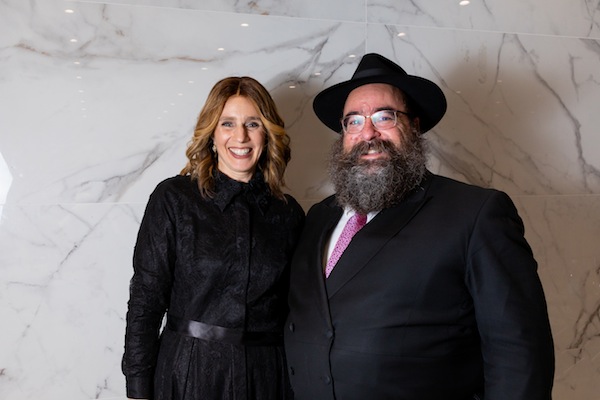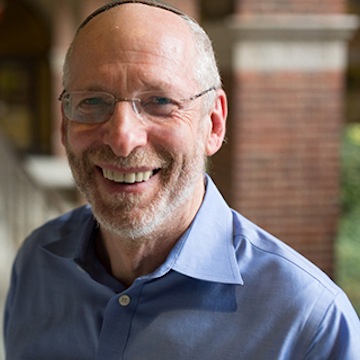Chabad Richmond honours Rebbetzin Chanie and Rabbi Yechiel Baitelman at June 19 gala. (photo from Chabad Richmond)
“The goal of the Freilach25 gala goes beyond just a thank you to me and Chanie,” said Rabbi Yechiel Baitelman, who is being honoured with his wife Chanie next month.
“It’s about promoting the Rebbe’s mission,” he said. “And, if Chanie and I can help do that, OK. We’re dedicated to doing the Rebbe’s work, to bringing the warmth of Yiddishkeit and the warmth of Torah and Chassidus (Chassidic philosophy) to as many people as we can, in whatever ways we can.”
Freilach25, which marks Chabad Richmond’s 25th anniversary and celebrates the Baitelmans’ many contributions to the community, will take place on June 19 at Schara Tzedeck Synagogue. The keynote speaker at the event will be human rights advocate Natan Sharansky, who will talk on the importance of dialogue and cooperation between Jews from both sides of the Iron Curtain in the struggle for the release of Soviet Jewry, as well as the urgency of building and strengthening Judaism in our community.
In a recent interview with the Baitelmans, they spoke about their 25-year journey with Chabad Richmond, which began in October 1993.
Lubavitch BC’s Rabbi Yitzchak Wineberg brought the young couple out to Vancouver to be shluchim(emissaries) of the Rebbe, Menachem Mendel Schneerson (1902-1994). Rabbi Yitzchak and Henia Wineberg were, and still are, their “supervisors,” but, in 2000, the Baitelmans went out on their own, when people asked for a Chabad centre in Richmond. Nonetheless, for the first 10 years, they maintained some of their duties and responsibilities for Lubavitch BC in Vancouver – programs, summer day camp, etc.
“Our kick-off event in Richmond was during Hanukkah,” said Rabbi Baitelman. “We put the word out and had parties at our home over a couple of nights. In fact, we held a lot of programs in our home – Sunday morning Minyaneers Club, classes, and other programs. We weren’t holding services yet, but we began expanding our programs.”
Chabad has had a presence in Vancouver for a long time. Not so for Richmond. “One of the biggest struggles we have in Richmond is getting the word out that we exist, what we do, and the welcoming atmosphere we have,” said the rabbi.
The Richmond Jewish community has evolved over the years and, he said, “There are different ways of measuring the changes. There are certain areas where we see incredible success and growth, in terms of the number of people participating and supporting Chabad. And financial support is an important measure of how much the community appreciates us, and the value they put on the work that we do. Thank G-d, our budget has grown every year, and we’ve been able to offer more programs and activities. When we first moved to Richmond, we were still getting a salary from Vancouver, we were just raising money for our programs. Today, all our funds come from what we raise. The financial ties with Vancouver are long over.”
Asked what it’s been like for their family being on shlichus here, Rebbetzin Baitelman said, “Our kids are very proud of us. It’s nice to hear that from your own children. It was hard because we didn’t have a lot of family here. So, our kids didn’t get to grow up with cousins and aunts and uncles and grandparents. But they learned a lot and got ‘voluntold’ to do lots of different jobs – cooking and set-ups and welcoming – so they’re like my assistants.”
Rabbi Baitelman spoke warmly of growing up in the Rebbe’s neighbourhood, being at his farbrengens (Chassidic gatherings) and seeing the energy, the love of every Jew, and the Rebbe’s commitment to the spiritual well-being of each Jew.
“It was an amazing inspiration, seeing the selflessness of the Rebbe,” he said. “My grandparents also had a big impact on me. My maternal grandparents were shluchim of the previous rebbe. All my aunts and uncles (my mother’s siblings, the Gordons) are all on shlichus. My parents were on shlichus until I was 2 or 3 years old. They considered themselves the unofficial embassy of Gordon shluchim around the world. Anyone inspired by the Gordon family would come to our home for Shabbos or after Sunday Dollars [every Sunday outside his office, the Rebbe would hand out a dollar bill to people who came to receive his blessing].
“And, of course, Rabbi Wineberg inspired us by giving us the opportunity to come out here – he guides us a lot. Rabbi Lipa Dubrawsky was also a significant role model for how to inspire and engage people. And, of course, my uncle Rabbi Josh Gordon impacted my life tremendously. He was a shaliach in California who accomplished great things. He turned out to be a very influential, dedicated powerhouse of a man, in terms of leadership.”
As to how they ended up in Metro Vancouver, Rabbi Baitelman said, “When Chanie and I met, we discussed shlichus and we knew this was something we wanted to do, to make it the focus of our life. We knew what being shluchim would entail, although I must say that being young and a little bit naïve helped. Being shluchim in North America fits with our talents and abilities.”
Chanie Baitelman had confessed to her husband that she had only one hesitancy. She said she asked him: “Wherever we go … could they please speak English, because I’m terrible at languages? Yechiel has a love for everything Russian, and he spent a couple of stints in Russia, and I was petrified we were going to end up there.
“Living here,” she said, “Henia Wineberg has been beyond inspirational. She took me under her wing and taught me how to navigate everything, even how to cook. When I got married, I knew how to cook three things, and one of them was cream of wheat, and only for a crowd. I was 21 years old when we came here and Henia would introduce me as ‘the new rebbetzin’ and I almost went through the floor.
“When I was younger,” she continued, “my goal was to go to seminary in Australia, which I did. My parents were always very involved in our community, so we followed along and worked with them. Our grandparents and aunts and uncles were on shlichus, and extremely devoted to the Rebbe, so it was almost by osmosis that we took it on. It was something we aspired to. We lived in a little suburb of Detroit, Mich., and we grew up very wholesome. Family was our primary example to follow.”
While her parents were not on shlichus when she was growing up, she said, “My father was a teacher in a Jewish (non-Chabad) day school and we were active in the Chabad community. My mother was also an educator. But now my parents are shluchim. They’ve been shluchim for 21 years, so they went out on shlichus after us.”
Both of the Baitelmans expressed gratitude when asked what message they’d like to impart to the community.
Chanie Baitelman said: “Thankfulness and gratefulness for allowing us to be part of your community and supporting and befriending us all these years. I’ve learned something from everyone I’ve met here.”
Her husband contemplated for a moment before answering. “First thing, gratitude is very important – gratitude to the Rebbe and all the people who inspired us to be shluchim, and who mentor us. I’m so grateful to those people who opened their doors to us when we were an unknown commodity, a young couple new to the community. I try to always remember to say thank you to them for their belief in us, for their friendship and their support.
“I believe there’s still so much to do, both in terms of our personal growth, and in terms of communal growth,” he added. “Our best days are ahead of us. We have challenges, but they bring out the best in us. I invite everybody who wants to be part of this to bring their talents, experience and energy forward to join us. We’re honoured and privileged to be on the journey with this community and, together, we should bring the Rebbe a lot of naches, and fulfil his dream and vision of the times of Moshiach, of a perfect world, when everybody will have what they need, and everyone will be happy and healthy and strong. And the beauty inherent in Hashem’s world will be visible and obvious to everybody.”
The Baitelmans are the conduits through which many in the community connect with the Rebbe and his mission.
“We’re just the channel,” Chanie Baitelman stressed. “It’s not the easiest job, you have to work hard, but we’re doing something meaningful. Really, it’s a privilege. That someone would pay us to do meaningful work, is just beyond. Like our kids say: ‘So, basically, Mom, you got your dream job. You’re living your dream.’”
The Rebbe often used the metaphor of light – the power of light is that you can ignite an infinite number of flames from one light.
“In a sense, we are all shluchim, we’re all doing the Rebbe’s work in one way or another,” said Yechiel Baitelman. “Some do it as their career, some do it through volunteering or financial support, but having so many people involved in this army of goodness and kindness, all inspired by the Rebbe, that’s so rewarding. I never really understood why people wanted to volunteer with Chabad, then I realized it’s because others inspire them to get involved.”
The Baitelmans aren’t people who seek out honours. However, said the rabbi, “If, by telling our story and being part of the Freilach25 gala, we can advance the Rebbe’s mission for the betterment of the community, then do whatever you need to do. It’s not really about us, but we’re very grateful. Just please remember that there’s a bigger goal beyond the thank you and acknowledgement. Something has to come from this, whether it’s supporting Chabad or getting more involved, whatever it might be. Over the next 25 years, there’s a lot more we need to accomplish, so please have that in mind.”
Tickets for the gala are limited. They can be reserved at chabadrichmond.com/freilach25.
Shelley Civkin is a happily retired librarian and communications officer. For 17 years, she wrote a weekly book review column for the Richmond Review. She’s currently a freelance writer and volunteer.


